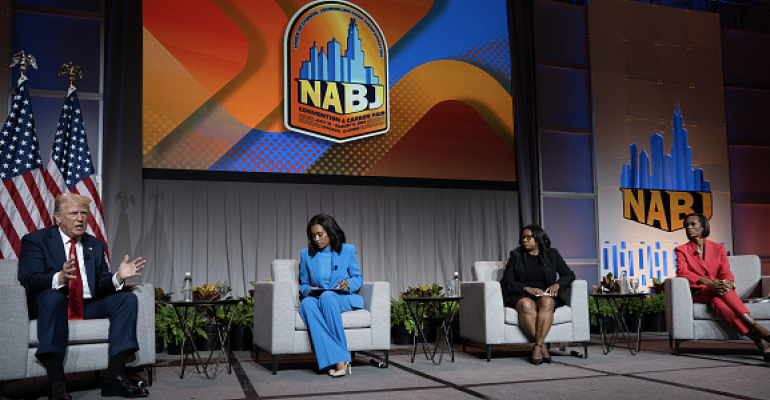For the leadership and the convention-planning team at the National Association of Black Journalists, a well-intentioned action backfired at this week’s NABJ annual convention.
From their difficult experience, business-event planners might take away a few lessons about the importance of open communication, detailed contracting, and understanding attendee expectations.
Here’s the skinny: Just two days before the start of the July 31-August 4 event at McCormick Place in Chicago, the association made a surprise announcement—it had gotten former President and current GOP candidate Donald Trump to participate in a Q&A session to be led by three NABJ members: Rachel Scott, senior congressional correspondent for ABC News; Harris Faulkner, anchor for FOX News; and Kadoia Goba, political reporter for Semafor.
“While NABJ does not endorse political candidates as a journalism organization, we understand the serious work of our members and welcome the opportunity for them to ask the tough questions that will provide the truthful answers Black Americans want and need to know,” said Ken Lemon, president of NABJ, in a July 29 press release. “We look forward to our attendees hearing from former President Trump on the critical issues our members and their audiences care about most.”
However, one of the co-chairs of the convention, Washington Post columnist Karen Attiah, posted to her social-media accounts on July 30 that she “was not involved or consulted with in any way with the decision to platform Trump in such a format,” and that she had resigned from her convention role as a result.
On-Site Complications
On July 31, Trump arrived at McCormick Place for his main-stage session but did not appear before the approximately 4,000 attendees until an hour after his scheduled time. On-stage audio problems were cited by Trump's team as cause for the delay, and there was at least one instance during the session where the panelists and Trump could not hear each other.
On the other hand, one journalist in attendance posted to his social-media account during the delay that he was told by an inside source of a conflict between Trump and NABJ regarding real-time fact-checking of his responses, to which Trump would not agree. It is unclear if Trump originally agreed to that condition in his contract when he accepted the invitation to speak.
In the end, the real-time fact-checking feature was not made available to attendees, angering some.
Further, Trump was combative once the Q&A panel began, insulting Rachel Scott more than once after she asked him a question, according to a report from The Guardian. And after just 35 minutes of a scheduled 60-minute session, Trump left the stage, citing a tight schedule.
Many NABJ attendees posted negative commentary about the session to their social-media accounts, with some saying NABJ’s decision to have him on stage was “tone deaf.”
Lastly, this article in USA Today noted that Trump’s appearance also raised safety concerns among some attendees, given the recent assassination attempt on him along with the fact that Chicago’s police and emergency-services personnel were already contending with the Lollapalooza music festival coming to town over the same weekend as the NABJ event. Those safety and security teams are also preparing for the Democratic National Convention from August 19 to 22.
After that first day of the convention, Ernest Owens, president of the Philadelphia Association of Black Journalist and editor at large for Philadelphia Magazine, told USA Today this about NABJ landing Trump as a convention speaker: “Just because you can do something don’t mean you should do [it].”





